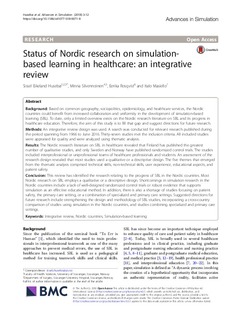| dc.contributor.author | Husebø, Sissel Iren Eikeland | |
| dc.contributor.author | Silvennoinen, Minna | |
| dc.contributor.author | Rosqvist, Eerika | |
| dc.contributor.author | Masiello, Italo | |
| dc.date.accessioned | 2018-11-01T13:13:48Z | |
| dc.date.available | 2018-11-01T13:13:48Z | |
| dc.date.created | 2018-07-04T18:40:56Z | |
| dc.date.issued | 2018-07 | |
| dc.identifier.citation | Husebø, S.E. et al. (2018) Status of Nordic research on simulation-based learning in healthcare: an integrative review. Advances in Simulation. 3(12) | nb_NO |
| dc.identifier.issn | 2059-0628 | |
| dc.identifier.uri | http://hdl.handle.net/11250/2570644 | |
| dc.description.abstract | Background. Based on common geography, sociopolitics, epidemiology, and healthcare services, the Nordic countries could benefit from increased collaboration and uniformity in the development of simulation-based learning (SBL). To date, only a limited overview exists on the Nordic research literature on SBL and its progress in healthcare education. Therefore, the aim of this study is to fill that gap and suggest directions for future research. Methods. An integrative review design was used. A search was conducted for relevant research published during the period spanning from 1966 to June 2016. Thirty-seven studies met the inclusion criteria. All included studies were appraised for quality and were analysed using thematic analysis. Results. The Nordic research literature on SBL in healthcare revealed that Finland has published the greatest number of qualitative studies, and only Sweden and Norway have published randomised control trials. The studies included interprofessional or uniprofessional teams of healthcare professionals and students. An assessment of the research design revealed that most studies used a qualitative or a descriptive design. The five themes that emerged from the thematic analysis comprised technical skills, non-technical skills, user experience, educational aspects, and patient safety. Conclusion. This review has identified the research relating to the progress of SBL in the Nordic countries. Most Nordic research on SBL employs a qualitative or a descriptive design. Shortcomings in simulation research in the Nordic countries include a lack of well-designed randomised control trials or robust evidence that supports simulation as an effective educational method. In addition, there is also a shortage of studies focusing on patient safety, the primary care setting, or a combination of specialised and primary care settings. Suggested directions for future research include strengthening the design and methodology of SBL studies, incorporating a cross-country comparison of studies using simulation in the Nordic countries, and studies combining specialised and primary care settings. | nb_NO |
| dc.language.iso | eng | nb_NO |
| dc.rights | Navngivelse 4.0 Internasjonal | * |
| dc.rights.uri | http://creativecommons.org/licenses/by/4.0/deed.no | * |
| dc.subject | sykepleieutdanning | nb_NO |
| dc.subject | sykepleie | nb_NO |
| dc.subject | simulation-based learning | nb_NO |
| dc.title | Status of Nordic research on simulation-based learning in healthcare: an integrative review | nb_NO |
| dc.type | Journal article | nb_NO |
| dc.type | Peer reviewed | nb_NO |
| dc.description.version | publishedVersion | nb_NO |
| dc.rights.holder | © The Author(s) 2018 | nb_NO |
| dc.subject.nsi | VDP::Medisinske Fag: 700::Helsefag: 800::Sykepleievitenskap: 808 | nb_NO |
| dc.source.pagenumber | 20 | nb_NO |
| dc.source.volume | 3 | nb_NO |
| dc.source.journal | Advances in Simulation | nb_NO |
| dc.source.issue | 12 | nb_NO |
| dc.identifier.doi | 10.1186/s41077-018-0071-8 | |
| dc.identifier.cristin | 1595725 | |
| dc.relation.project | Universitetet i Stavanger: 12714 | nb_NO |
| cristin.unitcode | 217,13,0,0 | |
| cristin.unitname | Det helsevitenskapelige fakultet | |
| cristin.ispublished | true | |
| cristin.fulltext | original | |
| cristin.qualitycode | 1 | |

